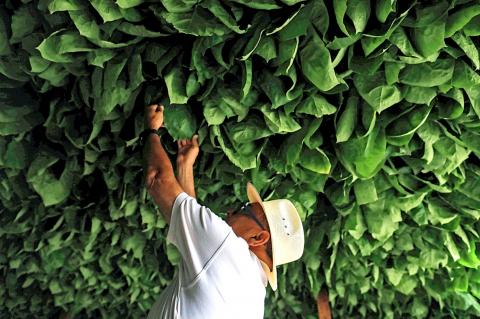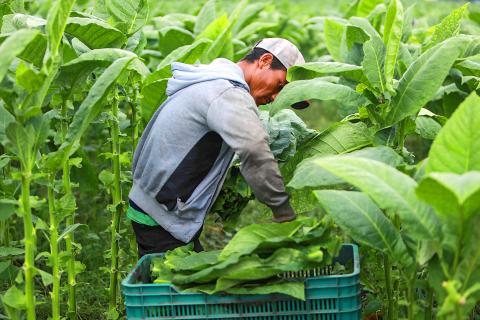From “rich and full-bodied” to “complex with hints of licorice,” aficionados exhaust the lexicon to capture the essence of Nicaragua’s most highly prized produce — not wine, but cigars, which are especially popular in the US.
The recognition turns the vibrant green hills of Esteli, in the Central American country’s northwest, into a hive of activity come harvest time.
There, 800m above sea level, half of the population of 110,000 is employed in the tobacco industry — picking, drying or curing, or rolling cigars in factories.

Photo: AFP
“No one has soil as good for tobacco as Nicaragua,” said Nestor Plasencia, whose family business is one of the nation’s leading cigar exporters, as he sits and savors the aroma of one of their creations.
Nutrient-rich volcanic soil and know-how imported from Cuba more than 50 years ago, as well as a knowledgeable workforce, have set Nicaragua apart when it comes to growing flavorful top-quality tobacco.
Apart from Esteli, the two other tobacco-growing regions are the Condega and Jalapa valleys in the north, each with their own distinct soils and minerals.

Photo: AFP
Part of the lure of Nicaraguan tobacco is that “the same seeds planted in different soils and climatic regions give different flavors,” Plasencia said, between puffs.
Cuban cigars might easily outsell the lesser-known Nicaraguan product in Europe, but Nicaraguan brands have taken advantage of the crippling US embargo on Havana — in place since 1961 — to sell to the Americans.
Nicaraguan cigar exports to the US have increased by 40 percent since 2008, reaching 140 million cigars last year, outstripping the Dominican Republic and Honduras, Cigar Association of America (CAA) data showed.
Nicaragua’s industry is a young one — it was started by Cuban exiles who fled Fidel Castro’s 1959 revolution. When Nicaragua’s civil war ended at the start of the 1990s, the industry started to flourish.
“My family started in tobacco in Cuba in 1865. Today we operate in Nicaragua and Honduras,” Plasencia said.
Today, the country has 70 factories producing more than 5,000 brands, Nicaraguan Chamber of Tobacco Producers director Wenceslao Castillo said.
Karina Rivera, a quality-control supervisor at Plasencia Cigars, tests an average of eight cigars a day.
“If I see that it’s not at the level of quality demanded by customers, we report immediately to find out where the problem is,” she said.
Smokers say a lot is going on in a cigar during puffs, tasting richness, balance and complexity — a variety of flavors and aromas that have helped several Nicaraguan brands conquer the US market.
Last year, US trade magazine Cigar Aficionado named seven Nicaraguan brands in the top 10 of its annual ranking.
As for the Best Cigar of the Year, the “E.P. Carrillo Encore Majestic” is made in the Dominican Republic, but with Nicaraguan tobacco, the magazine said.
“The strength of the Nicaraguan tobacco industry is our focus on quality, which is why we are today the largest exporter of premium cigars to the United States,” Castillo said.
It is clear that in the rarified world of premium cigars, names are important. To the aficionado, in clubs and the best bars, they trip off the tongue — La Opulencia Toro, La Imperiosa, Villiger La Vencedora Churchill.
“We believe that 60 to 70 percent of our success is due to the way tobacco is dried and the time spent on fermentation and aging — we don’t rush things,” Castillo said.
“The trilogy of this success is the soils, the microclimate and the people, the care they put into their work,” said Plasencia, who runs two factories in Nicaragua and exports 15 million cigars a year to the US.
The cigar industry has had to do more that resist climatic changes to survive. It is one of the few to emerge largely unscathed from the political and economic crisis that has rocked Nicaragua for more than a year.
“If it weren’t for these factories, Esteli would surely be deserted,” said 43-year-old Silvia Moreno, who has worked in the tobacco industry for half her life.

‘TERRORIST ATTACK’: The convoy of Brigadier General Hamdi Shukri resulted in the ‘martyrdom of five of our armed forces,’ the Presidential Leadership Council said A blast targeting the convoy of a Saudi Arabian-backed armed group killed five in Yemen’s southern city of Aden and injured the commander of the government-allied unit, officials said on Wednesday. “The treacherous terrorist attack targeting the convoy of Brigadier General Hamdi Shukri, commander of the Second Giants Brigade, resulted in the martyrdom of five of our armed forces heroes and the injury of three others,” Yemen’s Saudi Arabia-backed Presidential Leadership Council said in a statement published by Yemeni news agency Saba. A security source told reporters that a car bomb on the side of the road in the Ja’awla area in

PRECARIOUS RELATIONS: Commentators in Saudi Arabia accuse the UAE of growing too bold, backing forces at odds with Saudi interests in various conflicts A Saudi Arabian media campaign targeting the United Arab Emirates (UAE) has deepened the Gulf’s worst row in years, stoking fears of a damaging fall-out in the financial heart of the Middle East. Fiery accusations of rights abuses and betrayal have circulated for weeks in state-run and social media after a brief conflict in Yemen, where Saudi airstrikes quelled an offensive by UAE-backed separatists. The United Arab Emirates is “investing in chaos and supporting secessionists” from Libya to Yemen and the Horn of Africa, Saudi Arabia’s al-Ekhbariya TV charged in a report this week. Such invective has been unheard of

US President Donald Trump on Saturday warned Canada that if it concludes a trade deal with China, he would impose a 100 percent tariff on all goods coming over the border. Relations between the US and its northern neighbor have been rocky since Trump returned to the White House a year ago, with spats over trade and Canadian Prime Minister Mark Carney decrying a “rupture” in the US-led global order. During a visit to Beijing earlier this month, Carney hailed a “new strategic partnership” with China that resulted in a “preliminary, but landmark trade agreement” to reduce tariffs — but

SCAM CLAMPDOWN: About 130 South Korean scam suspects have been sent home since October last year, and 60 more are still waiting for repatriation Dozens of South Koreans allegedly involved in online scams in Cambodia were yesterday returned to South Korea to face investigations in what was the largest group repatriation of Korean criminal suspects from abroad. The 73 South Korean suspects allegedly scammed fellow Koreans out of 48.6 billion won (US$33 million), South Korea said. Upon arrival in South Korea’s Incheon International Airport aboard a chartered plane, the suspects — 65 men and eight women — were sent to police stations. Local TV footage showed the suspects, in handcuffs and wearing masks, being escorted by police officers and boarding buses. They were among about 260 South